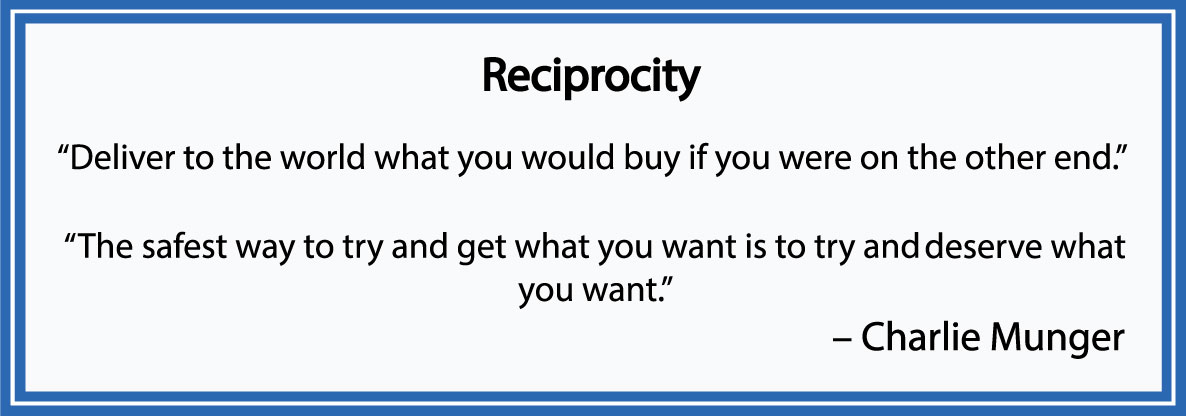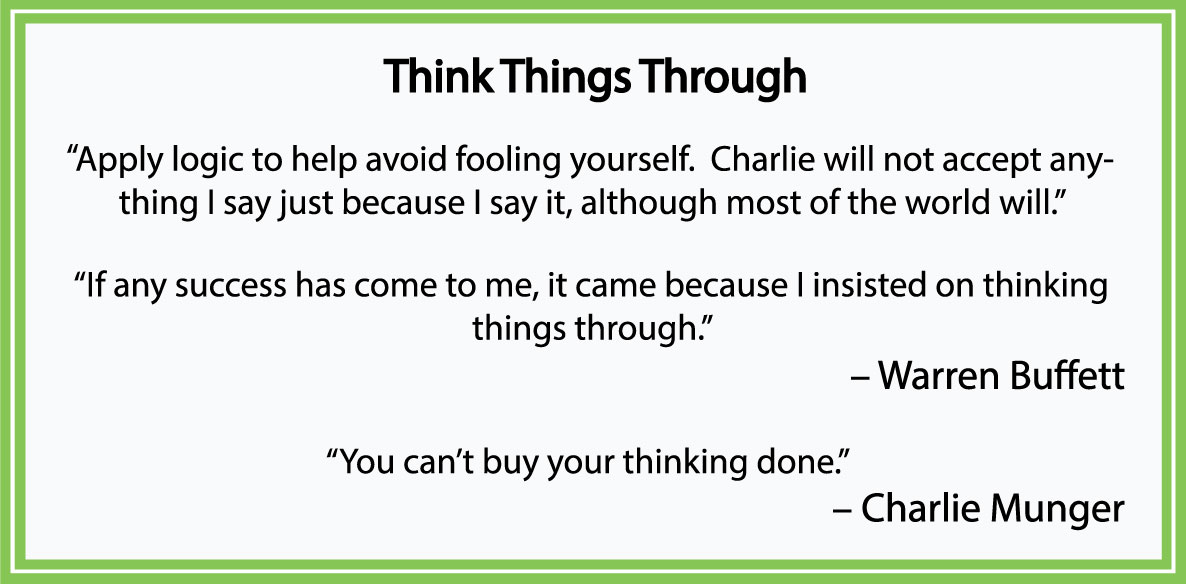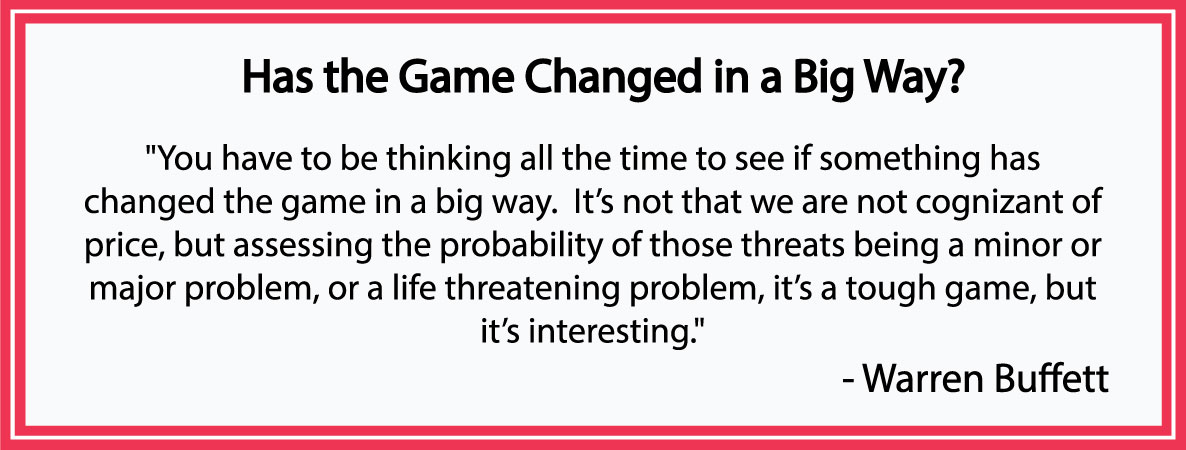Part 1 of my full notes and analysis from the past two week: September 3-16, 2017. Periodicals covered in this Wall Street Recap include the WSJ, FT, NYT, and LA Times.
ROE & Customer Ignorance
Ideally a company’s product or service would increase in demand as its customers become less ignorant. This is not always the case. Some companies build their businesses upon the ignorance of their customers. As a result, their moats decrease in direct proportion to the savviness of their customers.
Moats built upon ignorance have become increasingly tenuous as technological developments and market conditions have led to savvier customers.
Ignorance removal may occur with:
- Increasing competition. A more challenging competitive environment increases the pressure for businesses to cut costs, which incentivizes ignorance removal.
- Early adapters and social proof. Early adapters who assess the benefits of less known products, may induce others to adapt later on.
- Declining search and discovering costs. Low S&D costs lead to savvier customers.
Examples of Ignorance Removal
Honeywell (Increasing Competition)
China has become an increasingly competitive market for international businesses. This is due in part to the improved quality of Chinese-made products in conjunction with savvier customers. (link)
The fact that Honeywell’s struggles in China are related to the “savviness” of its customers and the quality of competing Chinese brands is disconcerting.
Football Helmets (Early Adapters, Social Proof, & Extra-Vivid Evidence)
The first football helmet from Startup firm ‘Vicis’, “tested better for safety than any helmet in NFL history.” Yet only “about 50 of the league’s 1,700 players-roughly 3%-took the field in week 1 in a Vicis helmet,”
The rest of the league continues wearing helmets that have inferior safety ratings. Riddell and Schutt, who have long outfitted most NFL players, continue to dominate the market.
The resistance to the new helmet comes from:
- Consistency and Commitment: “They are loathe to change, because of the familiarity they have with the helmet they have been using all these years,”
- Bias from non-mathematical nature of the human brain: “Executives and players say NFL locker rooms are largely populated by men who believe long-term brain damage is something that will happen to someone else and who fear the consequences of any dip in performance due to an equipment switch.”
While the incumbents may benefit from these psychological tendencies in the short-term, it’s a tenuous proposition to suggest that, without sufficient improvements to their helmets, their moats will endure. Early adapters and social proof will aid continued adoption of safer helmets. Furthermore, extra-vivid evidence of any injury sustained with a Riddell or Schut helmet could drive wide-spread adaption of safer helmets.
Toys “R” Us (Declining search and discovery costs)
Highly reliant upon ignorant consumers, retailers and consumer brands have crumbled under the pressure of increasingly savvy-shoppers. Having built their moats upon high search and discovery costs, they’re unable to withstand rapid declines in consumer ignorance. Toys “R” Us is one such example.
“Industry-wide, toy sales have been strong in recent years, though much of the growth is shifting to online sellers like Amazon.com Inc. and discounters like Wal-Mart Stores Inc. Amazon’s toy sales were up 24% last year, compared with 5% for the overall market and five years of declines for Toys “R” Us,”
Investment Lesson
Lesson: Beware of moats built on exploitation. Seek moats built on reciprocity.
A moat built around consumer ignorance is tenuous in nature. For a long-term sustainable advantage, search for companies that would benefit from declines in ignorance. Or as Charlie Munger might say, find companies that deserve to earn sustainable high returns on equity. Companies who exploit ignorance don’t deserve it.
One of Charlie Munger’s three investment holdings is Costco. Costco offers best in class service at best in class prices. Both of which are highly valued by its customers. Neither of which is easy to duplicate. Hence, Costco deserves the favorable return it earns.
Checklist Question
Question: Would customers choose this company’s product or service if they were well informed and had access to their competitor’s products/services?
Drive for Efficiency Gains
Companies will accumulate operating inefficiencies as they grow. When this growth inevitably slows or declines, companies may seek to expand margins by eliminating these inefficiencies.
Cycle: Growth —> Excess & Inefficiency —> Slowdown —> Drive for Efficiency Gains
Such strategies include;
- Simplify management structure (eliminate bureaucracy),
- Trim staff and eliminate redundant positions (can include industry consolidation),
- Simplify product offerings,
- Focus on core competencies (can include disposing of non-core assets),
- Become more adaptive to consumer demands and industry trends,
- Improve capital structure and return more cash to shareholders,
- Close poorly performing stores.
Examples of Companies Seeking Efficiency Gains following a Slowdown
Lego
Problem: First Sales Decline after 13 years of growth.
“Lego said Tuesday that its revenue for the first half of this year fell 5% from a year earlier to $2.4 billion, its first revenue decline in 13 years.” (link)
“Lego (said) its organization had grown too bureaucratic ‘to support global double-digit growth.’…We have added complexity into the organization which now, in turn, makes it harder for us to grow further,”
Solution: Seek efficiency gains through cutting jobs, reducing layers of management, & speeding up product roll-out.
“We will build a smaller and less complex organization than we have today, which will simplify our business model in order to reach more children.”
“On Tuesday, Lego said it would cut roughly 1,400 jobs, with between 500 to 6000 of these coming from its Billund, Denmark, headquarters alone.”
“It is also working to reduce layers of management and administration to speed product rollout, which Mr. Knudstorp said can involve 20 teams on average before a product is ready for global launch.”
Eli Lilly
Problem: Experiencing Industry-wide Pricing Pressure & Expiring Patents.
“Health insurers and politicians have stepped up pressure on prices…” (link)
“Lilly cited a number of issues that are plaguing many drug makers, including the need to lower costs and raise investment in new drugs ahead of patent expirations that are expected to erode sales of older products.”
Solution: Seek Efficiency Gains through cost cutting and dramatic reduction in the work force.
“That has left companies leaning on cost cuts and efficiency improvements to drive profit growth. The result is a dramatically shrinking workforce.”
“When the pressure gets heavy, the scrutiny turns to the size of a company’s payroll,”
“Drug companies have cut more than 269,000 U.S. workers since the beginning of 2007,”
Unilever & Nestle
Problem: Experiencing Shifting Consumer Tastes and Declining Sales.
“Amid this shift (in consumer tastes), sales from traditional players have flagged, spurring consolidation, cost cutting and restructuring.” (link)
Solution: Seek efficiency gains through Cost Cutting, Industry Consolidation, Restructuring (simplify product offerings), Boost Dividends, and Make Acquisitions to Accelerate Growth.
“In response (to activist posturing) the two consumer-goods firms (Nestle and Unilever) have focused on cost cutting and promises to boost dividends while going on the hunt for nimbler food and beverage brands with the potential to accelerate growth.”
“Nestlé, Unilever and other big companies in the sector are making (acquisitions) to catch up with fast-changing consumer tastes.”
VW
Problem: Dealing with Major Corporate & Political Scandal, recently became the largest auto company, by volume, in the world.
“VW long pursued the industry’s crown, only to face billions of dollars in penalties related to a U.S. regulatory scandal. It used software to cheat on diesel-emissions tests, a result of a growth-at-any-cost philosophy that claimed Detroit’s auto giants a decade earlier.” (link)
“We’re a big company and don’t have any interest in getting anymore bloated.” (link)
Solution: Optimize business through Restructuring (selling any business segments no longer considered critical).
“The company is open to talks and a new team is working to sell any businesses no longer considered critical. These noncore assets account for as much as 20% of the company’s current annual revenue,”
“…in order to see how we can optimize our business,”
Aerosoles
Problem: Expanded store count too fast and with too little consideration for cost. Struggled with major shifts in the retail sector as well as disruptions in its supply chain.
“In 2012 and 2013, Aerogroup expanded to 125 retail stores, a ‘rapid pace’ that meant the company didn’t always get the best terms on leases, according to court papers.” (link)
“Last year, the company’s supply chain was disrupted when the sole sourcing agent in Asia stopped providing goods. The interruption cost Aerosoles customers permanently, court papers said.”
“Intense industry competition,” & “major shifts in the retail sector.“
Solution: File for bankruptcy production, close a majority of company stores, and (presumably) focus efforts on sales through department stores, online retail, and home-shopping networks.
“Some 74 of Aerogroup International Inc.’s roughly 80 stores are candidates for immediate closure, with proceeds of the liquidation earmarked to help fund a continued sales effort, according to court papers.”
“In addition to its retail operation, the Aerosoles brand is sold at well-known department stores, on home-shopping networks and Amazon.com.”
Changed in a “Big Way”?: Value of U.S. College Degrees
“You have to be thinking all the time to see if something has changed the game in a big way.” – Warren Buffett
For decades properties surrounding U.S. colleges had a can’t miss combination of limited supply and an ever increasing demand for degrees. On several occasions I’ve been advised by successful real estate investors to buy college properties . This was sound advice for decades, and may still be, but what if the game has changed in a big way? What if the demand for U.S. college has shifted dramatically lower, and with it, demand for university housing? Two WSJ articles shed some light on these very real, yet uncommonly held concerns.
1) Americans Losing Faith in College Degrees, Poll Finds (link)
“Four years ago, (Americans without college degrees) used to split almost evenly on the question of whether college was worth the cost. Now skeptics outnumber believers by a double-digit margin.“
“Overall, a slim plurality of Americans, 49%, believes earning a four-year degree will lead to a good job and higher lifetime earnings, compared with 47% who don’t…That two point margin narrowed from 13 points when the same question was asked four years earlier.”
“Meanwhile, student debt has surged to $1.3 trillion, and millions of Americans have fallen behind on student-loan payments.”
2) U.S. Colleges Slip in Global Rankings (link)
“The U.S. continues to lay claim to more elite research universities than any other country in the world, but that dominance is beginning to fray.“
“(This) marked the first year that schools outside the U.S. seized the two top positions in the 14-year history of the list.”
“This marked the fifth year of consecutive decline in the overall showing of the U.S. This ranking listed 62 U.S. schools in the top 200. In 2014, 77 U.S. universities ranked in the top 200.
“…there are clear warning signs and fairly significant flashing red lights that the U.S. is under threat from increasing competition,…Asia is rising. It’s worrying time for stagnation for the U.S.”
“In recent years, Chinese universities have worked to internationalize their course offerings and attract more foreign students. The efforts have paid dividends: in 2016, according to government figures, more than 440,000 foreign students were studying in China, with students mostly hailing from South Korea and the U.S. That figure marks a 35% increase over 2012.”
“The rise of Chinese universities also comes as the Chinese Communist Party has invested heavily in research universities.”
Investment Implications
The tailwinds that favored college housing for the last 30 years have slowed. If the demand for U.S. college degrees has indeed shifted downward, I’d expect demand to dry up in traunches, starting with third tier universities and moving on up. This would imply that real estate around third and second tier universities is more vulnerable to a downward shift in demand, while first tier universities would fair relatively well.
Investment Lessons
Lesson 1: Insist on thinking things through.
It’d be far too easy to blindly follow the advice of a successful investor. To avoid going terribly astray, insist on thinking things through. Do not simply take an expert’s word for it.
Lesson 2: Look out for things that have changed in a big way.
In the past, college housing benefited from huge long-term tailwinds. But as the famous investment clause suggests, past performance does not guarantee future returns. Do not naively extrapolate past trends into the future. Rather take time to assess what drivers will harm or benefit an investment moving forward.
Checklist Question
Question: Has anything changed in a big way?
Standard Causes of Human Misjudgment
Disliking Bias
Why China Can’t Stop Hating Japan (link)
“Beijing sanctioned a relentless diet of anti-Japanese propaganda. A besieged party eager to rally the masses saw no better vehicle than reviving attacks on the ‘historical criminal,’ Japan. Over time, policy towards Japan has become so sensitive that any Chinese official who advocates reconciliation risks career suicide.”
“If you [say] any nice words about Japan then you will get an angry reaction from students,”
Reciprocation: Role Theory
Why China Can’t Stop Hating Japan (link)
“Leaders in Beijing still use the idea of Japan as China’s enemy to rouse the citizenry. The Japanese, seeing themselves depicted as China’s foe, have increasingly begun to act like one.”
“Sixth: bias from reciprocation tendency, including the tendency of one in a role to act as other persons expect.” – Charlie Munger
Bitcoin: Reinforcement & Social Proof
1) China Bans Digital Coin Offers as Celebrities Like Paris Hilton Tout Them (link)
“The losses haven’t deterred some (crypto currency) buyers, many of whom have made so much in other deals that they are eager to take more chances.“
“In a year, he turned an in heritance of $80,000 into a couple of million dollars. “It was pure luck, literally,” he said. Mr. Bardi then put $1 million into Bancor, even as the price was falling”
“While Mr. Bardi said he is mindful of price swings, and isn’t willing to take a chance on another token offering, he said he believes in Bancor’s product and has no plans to sell. “I’m not really touching it,” he added.”
“Nothing seduces rational thinking and turns a person’s mind in mush like a big pile of money that was easily earned.” – Charlie Munger
2) Bitcoin in sharp drop after Jamie Dimon ‘tulip bulbs’ barb (link)
“(Jamie Dimon’s) comments were dismissed by fintech executives who said Mr. Dimon had criticized bitcoin before but the currency continued to surge.”
“If you think about the doctrines I’ve talked about, namely, one, the power of reinforcement — after all you do something and the market goes up and you get paid and rewarded and applauded and what have you, meaning a lot of reinforcement, if you make a bet on a market and the market goes with you. Also, there’s social proof. I mean the prices on the market are the ultimate form of social proof, reflecting what other people think, and so the combination is very powerful. Why would you expect general market levels to always be totally efficient, say even in 1973-74 at the pit, or in 1972 or whatever it was when the Nifty 50 were in their heyday? If these psychological notions are correct, you would expect some waves of irrationality, which carry general levels, so they’re inconsistent with reason.” – Charlie Munger
Pre-suasion: Fear of Missing Out
Newport Beach precious metal dealer Monex accused of $290-million fraud (link)
A complaint against Monex, a precious metals investment firm, says that the company encouraged its sales force to use this ‘pre-suasion-esque’ sales pitch:
“If gold were to increase in value by $100 per ounce in the next year, and you had a 30% to 40% net gain, you’d feel pretty good, wouldn’t you?”
Uncertainty & Extra-Vivid Evidence
Florida Gas Stations Running Out of Fuel as Irma Threatens State (link)
The unknown path of Irma, along with extra-vivid evidence of its destructive power induced widespread panic and buying across the entire state of Florida. There’s an investing lesson in there somewhere.
“Because of Irma’s unknown path, panic buying has been widespread in the state, rather than confined to a few counties…’You basically had all 67 counties with a run,'”
“This storm has the potential to devastate our state,” Rick Scott said (link)
Incentive Caused Bias
U.S. Colleges Slip in Global Rankings (link)
“Elizabeth Perry, a professor at Harvard and expert on China, said the Chinese are actively ‘gaming’ the system. ‘They are hiring an army of postdocs whose responsibility is to produce articles,’ she said. ‘They are changing the nature of a university from an educational institution to basically a factory that is producing what these rankings reward.‘”
Economic Warfare: Companies in the Crossfire
International disagreements and conflicts result in economic “attacks” much more frequently than they do in military attacks. Be careful that your investment doesn’t end up a casualty of economic warfare.
Examples of Recent Activity
Germany & Turkey: Germany threatens to cut aid to Turkey
“…prompting Berlin to issue a travel advisory for the country and threaten aid cuts.” (link)
“The two countries’ ties started fraying last year, after Germanys parliament adopted a resolution branding the killing of more than a million Armenians by Ottoman Turkey in 1915 and 1916 as genocide, sparking protests in Ankara.”
Saudi Arbia & Qatar:
“Saudi Arabia, the United Arab Emirates, Bahrain and Egypt in June severed diplomatic ties and closed their air routes and land and sea borders with Qatar to protest its alleged support for regional extremist organizations and terrorist groups.” (link)
USA & North Korea:
“A U.S. proposal for new United Nations sanctions would clamp an embargo on its oil and textile trade and slap a full asset freeze and world-wide travel ban on leader Kim Jong Un and key regime members and institutions.” (link)
“We are worried that cutting off oil exports will inflict damage on North Korea’s hospitals and an ordinary people,” Mr. Putin said
(De)Commoditized Flights
The statements below address what’s happening in air travel, but doesn’t address why.
“Passengers get into anything that flies if the ticket is cheap.”
“For a small fare difference, (passengers) still pick less-comfortable airplanes. Airlines say cost is the No. 1 factor when evaluating new airplanes.” (link)
To draw the inference that customers only care about price would be misleading. After all, price is the only factor in the purchase decision which customers can easily assess. Factors such as comfort, amenities, and service are either not easily assessable or completely unknown. So of course air travel has tended towards commoditization. After all, why pay 20% more for a flight when I have no idea what I’m getting for the extra money?
Why not give consumers an easy way to objectively assess comfort, amenities, and service and see what happens? If an American Airlines flight had an 87 rating on comfort, amenities, and service, I’m likely to pay up for that flight over one with a 62 across the board. Or better yet, attempt to assign some dollar value to them.
Such a system would contribute to the de-commoditization of flights. But as it stands, these factors are wholly unassessable, and thus, I’ll continue to be over-influenced by price.
“You need to have a passionate interest in why things are happening. That cast of mind, kept over long periods, gradually improves your ability to focus on reality. If you don’t have the cast of mind, you’re destined for failure even if you have a high I.Q.” – Charlie Munger
Various Fascinating Excerpts
Flood Insurance: Highly Skewed Losses
“(In Florida) Homes and other properties with repetitive flood losses account for just 2% of the roughly 1.5 million properties…But such properties have accounted for about 30% of flood claims paid over the program’s history.” (link)
The Economics of Politics
“Here we are in the minority…and we’re dealing from strength because they don’t have the votes…Here the vote is the currency of the realm. It’s all about having the votes.” – Nancy Pelosi (link)
“They’re the only two people who came to the meeting with a deal to be made.” – President Trump on cutting a deal with Democrats.
Demand Excellence
“‘The lesson’, he said, was that ‘if you don’t demand excellence, you’re not going to get it.'” – Don Ohlmeyer (link)
Censoring Social Media in China
“Last year, officials imposed stricter controls on (social media) apps, forbidding sexual content and original reporting during live-streams. The government has also shuttered dozens of live-streaming sites and fined some hosts for obscene language.” (link)
“Mr. Li understands the government’s power to break stars, and said he had cleaned up his act to avoid trouble.”
Future of Augmented Reality
“A lot of people underestimate what is happening,..This is one of those things that is going to completely change the game in the next two or three years. It’s like right before the Big Bang…It is definitely not a novelty,…This fundamental shift will change how we interact with computers, live our lives – and sell furniture.” – Michael Valdsgaard, head of digital transformation at Ikea, an early adopter of ARKit (link)
China credit expansion
“No other economy in history has grown this fast without confronting some kind of a big crisis.” (link)
Hilarious Foot-in-mouth moment
“Martin Schulz, leader of Germany’s Social Democrats, had some strong words for a Hamburg landlord planning a huge rent rise. It was ‘daylight robbery’, ‘immoral’, the ‘unscrupulous exploitation of poor people’.” (link)
“But there was embarrassment in store for Mr. Schultz. A presenter revealed that Ms. Braun’s landlord was a construction company owned by Hamburg City Hall – which is Social Democrat-controlled. All 150 studio guests erupted in laughter.”





